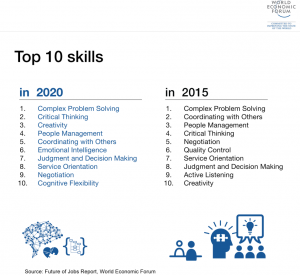The World Economic Forum’s Future of Jobs study http://reports.weforum.org/future-of-jobs-2016/ predicts that 5 million jobs will be lost before 2020 as artificial intelligence, robotics, nanotechnology and other socio-economic factors replace the need for human workers. The top 10 skills that will be needed in future workplaces are described here.

It is most likely that many mathematical skills involved in complex problem solving and critical thinking will be automated in the future; this will be the case in B2B market research and consumer research. Some of those working in market research and data analysis with mathematical skills will be needed to parent the machines and ensure the logarithms behave in an ethical way. Machines and algorithms will impact how we manage masses of data, spotting trends and the repetitive work of detailed analysis. This will leave plenty of scope for humans to undertake more advanced mathematical analysis.
David Deming, associate professor of education and economics at Harvard University, argues that soft skills will be crucial. The emphasis of developing people for the research jobs of tomorrow will certainly include soft skills. Today, soft skills for market research include people management, cognitive flexibility, judgement and collaboration. As human beings it is our interpersonal skills that make us particularly human.
Today and in the future, B2B market researchers and customer researchers will support organisations in their quests for: brand tracking, segmentation, new product development, thought leadership, market trends and competitor analysis. But what is most highly valued by clients, about market research and data analysis, is collaboration skills to share the best results and influence their organisation’s growth plans. In the future collaboration, sharing and influencing will be highly valued skills, the same as they always have been.
